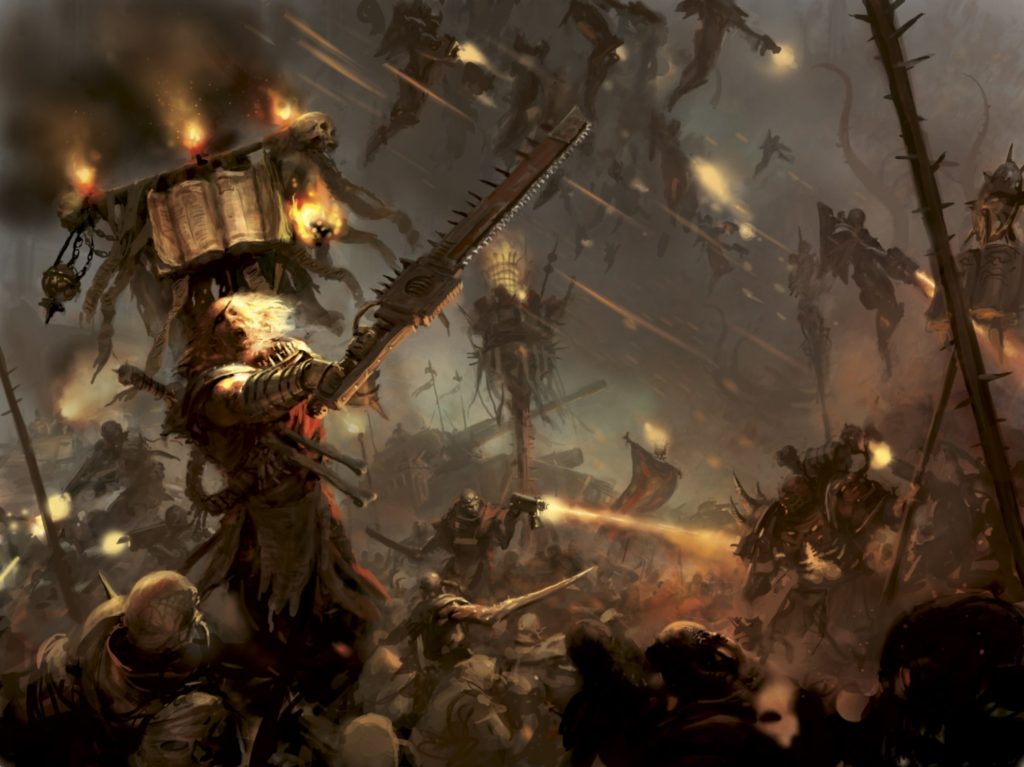
Welcome, 40K fans, to a series of articles I am writing about some of the deeper aspects of Warhammer 40,000.
These articles are a thought exercise, and by writing them I hope to improve my thinking about 40K and its fiction (and maybe about much more). Topics in this series will be wide-ranging and will not shy away from moral or philosophical issues that some may consider sensitive or even controversial. I would rather risk the conversation, so while you or I may not agree, I look forward to hearing why. Consider yourself warned for lore spoilers as well. Also, check the Tactics Corner for more great articles on gaming in 40K!
The Religious Cliche
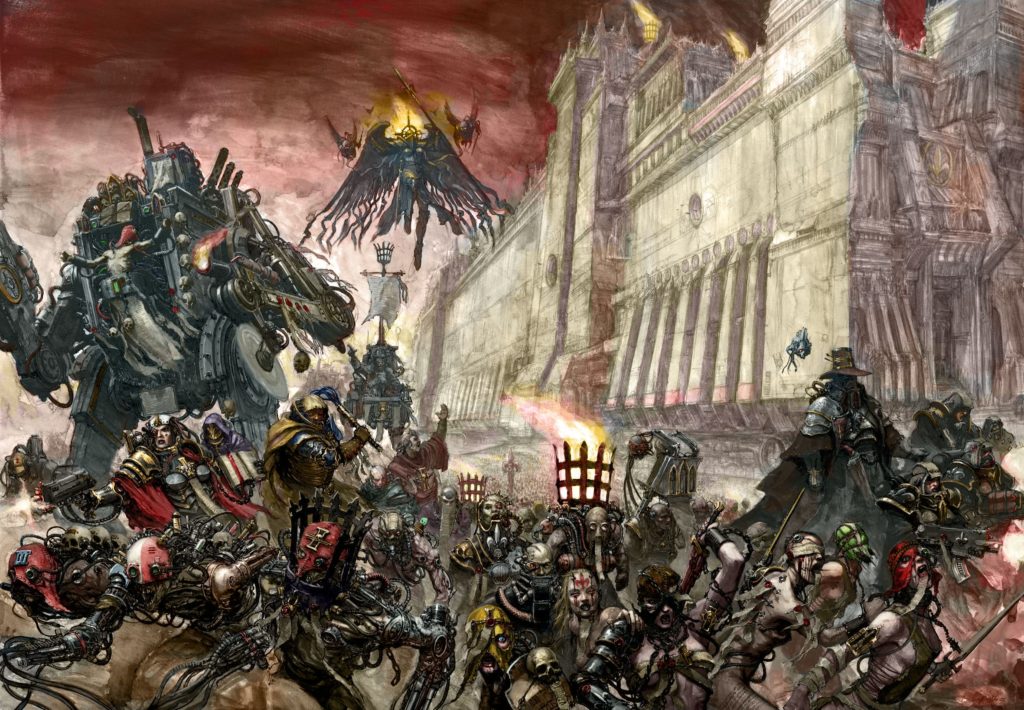
The Imperium of Man in 40K is a complex problem to figure out. It can be pulled apart from many different directions, and most of them have merit in some way or another. Often, I see people only really touch the low-hanging fruit-equivalent of critical ideas when it comes to analyzing the Imperium’s simulated human problems. One of the big areas that I want to address now is the Imperium as a metaphor for the tyranny and backwards thinking of religion in general.
Considering the world we live in, it is very en vogue to dismissively point a finger at religion as a relic of a lesser, bygone age of human stupidity, and to look at those who still hold to a religious lifestyle as idiots. In the face of scientific achievement, why would people waste their time on religious ideology? Wouldn’t it be better for everyone to give up on all of that superstition so we can move on?
Let’s be honest, because there are a lot of good arguments for that perspective. To borrow a religious phrase, “You have to give the devil his due.” Having just come out of university education in the humanities, the faults and excesses of religion and religious thinking are now almost a sad cliche to me as they are represented in media and popular fiction. There are some very good reasons (represented by the worst part of some religions) that people want reason and logic to play a bigger role in our decision-making process as a continually more interconnected global society. There’s also some great evidence for the benefits that scientific thinking has for society as a whole.
Morally Grey

In fact (to bring this back to 40K), the entire notion of the Imperial Truth was built upon this idea – that we can live on logic and science and by embracing those things fully we can bring humanity further than we could if we were still shackled by the manacles of belief and religious thinking. The problem with logic, as is explored in the failure of the Imperial Truth during the Horus Heresy (or by moral atrocities of the “Greater Good” philosophy of the T’au) is that you can justify a wide range of terrible and amoral things in the pursuit of logic. Even now, in modern society, we are still debating how logic could create an overarching human ethic that tells us the proper way to live. Modern western logical thinking about morality has a strong root in religious thinking and morality, and modern-day materialist philosophers who have come out of the West haven’t been able to divorce themselves from how their understanding of morality is connected to a western religious ethic.
The Subjective Lie of Right and Wrong
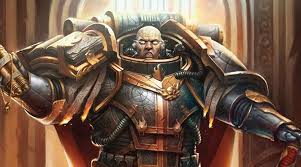
Logic and science can describe a cause-effect pattern of how things operate in the world, but we haven’t advanced far enough for the scientific method to tell us the proper way to act in the world. The more we split ourselves into us vs. them groups and consider a (to borrow a phrase) a “greater good” for humanity, the easier it becomes to embrace things like eugenics as the best way to filter out what is good and bad. Even saying that makes my skin crawl, and likely does for many people. What’s the use of an effort meant to weed out what is good and undesirable in people if you can’t trust the ethic that guides that effort? There have been some pretty awful ethics that have tried to justify that sort of process in the past and even uncomfortably recently.
After all, good and evil are not so easy to categorize in the world of reason, and lacking a prevailing ethic, a moral relativist view or a straight materialistic perspective of living in the world simply boils the issue down to good and evil to being matters of perspective. If that were the case, then why do so many of our narratives (40K and 30K narratives included) focus on the noble, moral few standing up against the cruelty of the many? We’ve told this story over and over again in fables inside and outside of religious literature and prose for thousands of years. Why is this question important? If enough people see something a minority considers ‘evil’ as part of their perspective, then doesn’t that perspective merit acceptance by the minority?
I don’t accept good and evil as matters of perspective. While good is pretty hard to nail down in a way we can all agree on, evil isn’t as hard in most cases to categorize or witness, and if evil exists then what isn’t evil must be good, and while we can be grateful that what evil isn’t includes a lot of things, there are a lot of things that evil is, and that’s not what most of us want to be.
The Other Side of the Religious Moon
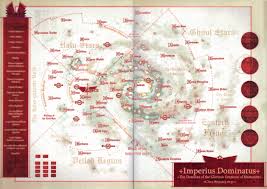
If we are still trying to be honest, however, we can’t ignore the good role that religion has played in lives over the centuries, or rest the blame for human cruelty solely on the shoulders of religion or God. Most people have just been trying to get by, and have been aiming at a higher way of living with varying degrees of success. Not many people catalog the profound acts of love, goodness, charity, compassion, friendship, understanding, and service that the highest ideals of religion teach and very often still accomplish. Instead there is a focus on how often people fail to live up to those high ideals, and I think that to a certain extent that is fair, but it does not tell the whole story. Closer examination sees that religion is more than just pyres, crusades, persecution, and dogma, though it has often included those things. In that same honest evaluation, reason has had its own pyres, gas chambers, gulags, firing squads, and persecutions. The great experiments with reason in the 20th century demonstrated that for all its benefits, logic can also be terribly efficient at the administration of catastrophic tragedy. What is the constant between reason and religion? Humanity. People. Us.
The idea that the Imperium is solely a caricature of religion, and that religion only is fundamentally responsible for the death, ignorance, and oppression of all societies across history only grazes the edges of what is a wider human problem. I would posit that anyone who is looking at the Imperium and 40K solely as a religious parody hasn’t really been paying attention. We have to have our eyes open and consider both dangerous extremes of thought and which ones we are susceptible to falling in line with.
Having a Secular Cake and Eating It, Too
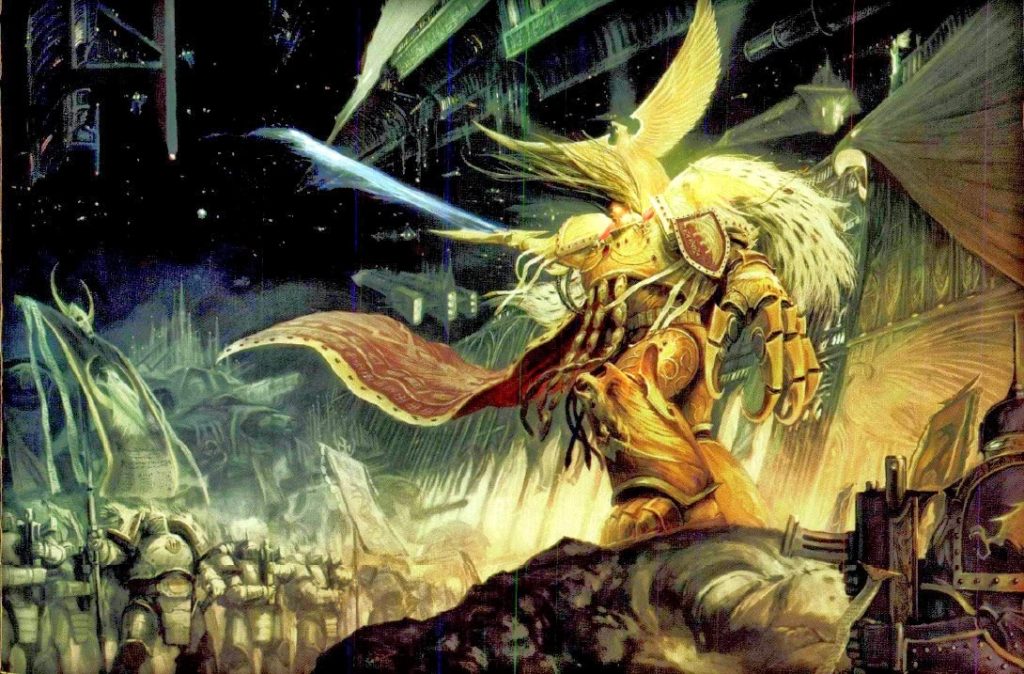
Remember that the Imperium was established as a secular ideology that committed acts of genocide and slaugther across a 200-year galactic campaign to exterminate religion and belief in the name of enlightenment and scientific truth.
“There have been other consts incurred by the [Imperial Truth] which have undermined the Emperor’s dream of Imperium. Many billions of lives were lost in the purges required to maintain it. Ancient civilizations, directly descended from Old Earth, who carried with them across the cosmos the torch of religions deemed anathema in this enlightened age were simply murdered for their beliefs. Tens of thousands of cities were burned, cultures were put to the sword, and worlds were annihilated in the name of the Truth.”
Horus Heresy Book 8: Malevolence, Page 10
This can be easily paralleled to the Soviet Union and the communist uprising that deemed it prudent to eliminate religion entirely and set up a system of state atheism.
“The Soviet policy of state atheism (gosateizm), albeit inconsistently applied, remains a major goal of official ideology. Massive state resources have been expended not only to prevent the implanting of religious belief in nonbelievers but also to eradicate ‘prerevolutionary remnants’ already existing. The regime is not merely passively committed to a godless polity but takes an aggressive stance of official forced atheization. Thus a major task of the police apparatus is the persecution of forms of religious practice. Not surprisingly, the Committee for State Security (KGB) is reported to have a division dealing specifically with ‘churchmen and sectarians.’ “
Protest for Religious Rights in the USSR: Characteristics and Consequences, page 426
This system encouraged the mockery, persecution, confiscation of wealth/property, forced labor of believers/clergy, and ultimate destruction of religious traditions across eastern Europe and Asia, and resulted in the death and/or gulag enslavement of millions of real people. 40K is as much a parody of rampant religiosity as it is a reminder that you don’t need a deity in order to rationalize the deaths of all those who won’t do what you want (or what you think is best), and that the logical ends don’t justify the means. With the right ‘why,’ any ‘how’ can be justified. 40K fiction has (deliberately or not) looked at the histories of religion and reason and once again pushed the scale up so big that we almost lose sight of the forest for the trees.
So, 40K fiction is simultaneously wagging a finger at the worst tendencies of religious malfeasance in the 41st millennium and is pointing in condemnation at the atrocities of human reason in the 20th century using the 31st millennium as a metaphor – all at a transhuman scale. Religion and reason are mere scapegoats to a more fundamental human reality which is that with the right (or wrong) ideology you can push the boundaries of known suffering to heretofore unknown frontiers, and the only thing you need is people. Religion and reason can each have their own destructive dogmas. It is prudent to think over these moral questions before we eventually do get big enough to create the horror at what is now a fictionally, comically obscene scale.
Good, Evil, and You
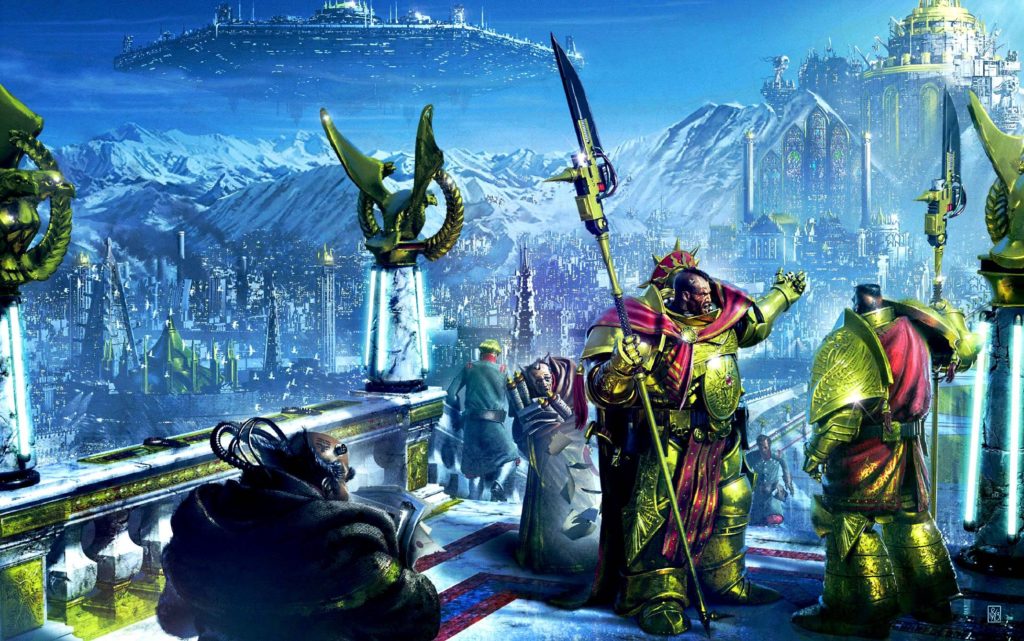
Whether you are a religious or a secular thinker (or both), take a minute and do a gut check. Take a moment the next time you read a story in the Grimdark simulation and ask yourself what parts of whatever is going on that you don’t like or consider amoral you see yourself supporting or ignoring. Better yet, imagine yourself as the one doing the day-to-day maintenance of the destructive dogma you are figuratively propping up. After all, you have something in common with all secular and religious killers throughout history – you are human. Regular people are the tools wielded by demagogues and tyrants to enforce their wills, after all. There’s relatively little separating you from the people from history you spit on as despots, dimwits, and dupes.
In Conclusion
So, I think if we are considering these things properly, we are looking at how we relate to the worst aspects of both extremes. While we collectively struggle to figure out the proper way to act in the world (much like we do in the moral simulations of these novels), let’s not ignore one part of the parody here in favor of the other, especially the part that makes you the most uncomfortable.
On a Lighter Note
So, we’ve exhausted or outraged ourselves considering the surface level of this heavy topic, so why don’t we end thinking about something wholesome and worthwhile?

Some of you here may be familiar with my previous articles about how amazing the BattleHaven experience is. It is coming up again this year from May 5 – 9th, 2020.
I’ve had an incredibly stressful year so far, but one of the things I keep coming back to is how much I’m looking forward to BattleHaven this year. Sarah, who runs the show, is an incredible host to me and my wife. We are fed well, play tons of games, enjoy the scenery, and get to soak in all the best things about being a Wargamer. What better place to discuss topics such as this than at BattleHaven?
As it turns our, Sarah has a couple spots left to fill, so if you are interested at all in going, then get in touch with her at BattleHavenEvents@gmail.com. If you mention that Captain Morgan sent you, she’ll knock $100.00 off your trip package.
An Ongoing Conversation
If you found this interesting, please check out my page Captain Morgan’s Librarius. This is the space where I test these ideas in their first drafts, and also talk about all the other parts of the hobby that I enjoy from painting, community, gaming, and all the rest. It’s also the best place to converse with me about this and many other topics in 40K. Likes and shares are appreciated. I hope you enjoyed this week’s read, and I’ll see you again next time!
And remember, Frontline Gaming sells gaming products at a discount, every day in their webcart!

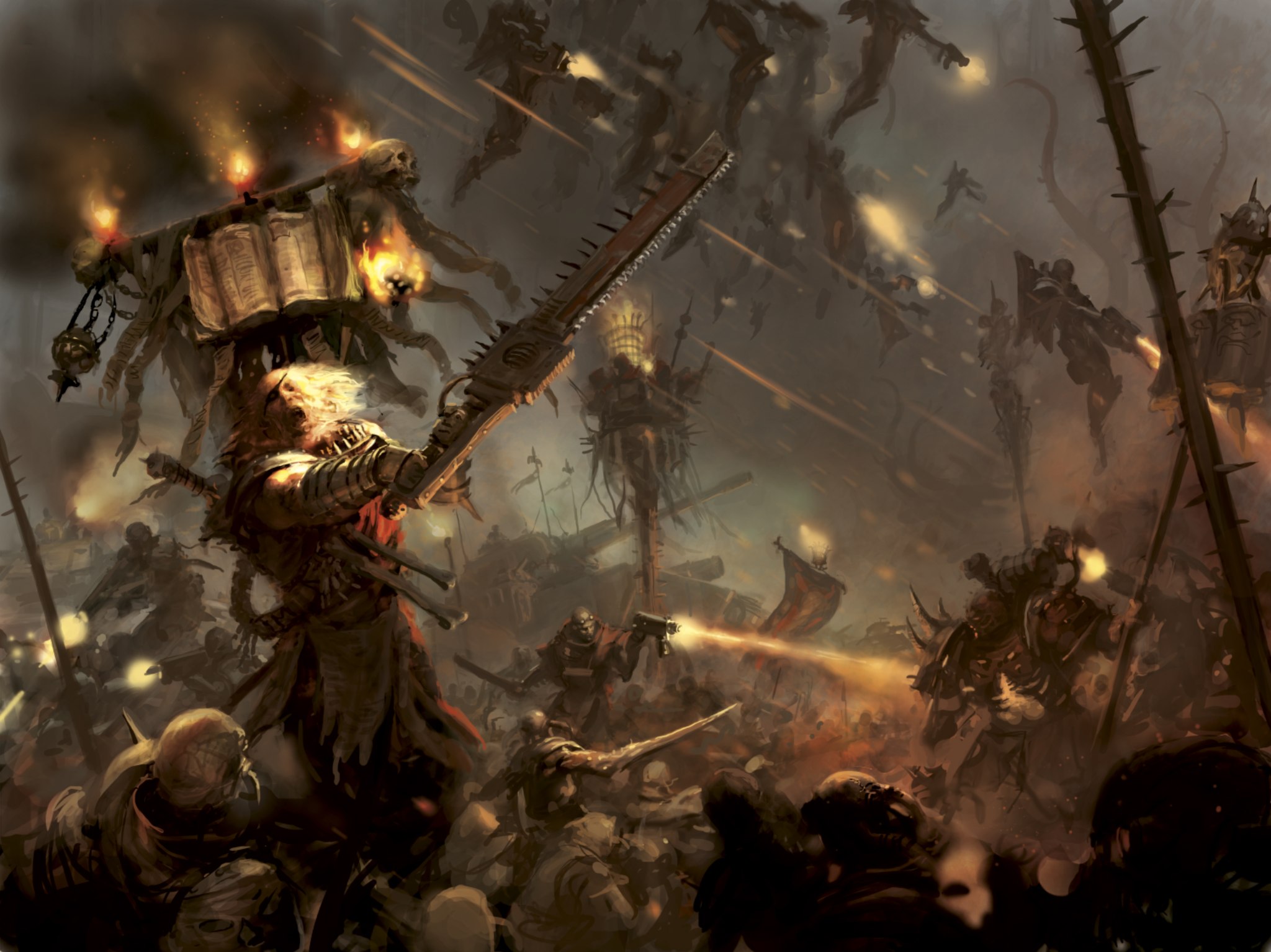


The only constant in the universe is change. Any moral system breaks down in corner cases, which is why the Trolly Problem is so much fun. There’s always a little change you can make that might change what you perceive as being moral or true. In our day-to-day lives, this is unlikely to have a big impact on us, and few of our decisions have such massive ramifications, affecting a very small group of people.
But in 40k, the actions or inactions of a few can have truly and literally world-shattering effects on entire civilizations of others. 40k, in a way, almost asks the question of what price is survival worth by showing us what the answer of “any price” can look like.
Keep these going!
Same, enjoying these more intellectual articles quite a bit =)
Interesting article.
It’s a pity the author doesn’t go more into the historical origins of 40K itself. The game arose as a send-up of Thatcher’s Britain. While its developed along its own lines over the years, the underlying themes and premises of an overworked society being sold on ephemeral virtues by an authoritarian government remain strong in the game.
The core Good versus Evil narrative in the game is directly from this. We’re told that it is only through the continual discipline of the Imperium’s populace that Chaos can be staved off, much as the UK and USA governments claimed in the 1980s that it was only the vigilance of population that kept Soviet tanks from rolling past one’s home. In 40K, secret organizations, the genetically imperfect, and heretics within the Imperium are under perpetual persecution, which mirrors the experiences of labor unions, LGBT persons, and people not part of the COE under the 1980s Tories.
In all, 40K shows us an Imperium that we can assume is probably better than living under Chaos but is itself deeply flawed and imperfect, and it does not fully embody the virtues it professes. We, as readers, are presented with a choice between the unparalleled and unwelcome insanity of Chaos and a less-than-ideal Imperium. In light of this dyad, it’s easy to presume that the Imperium is good because Chaos is definitively evil, but it’s not so simple. Certainly parts of the Imperium are good, but there’s so much dross the ideals may well drown. This structuring isn’t uncommon in 1980s’ (or contemporary) political discourse. You’re either with us or against us, and if you’re with us then you must ignore all our sins to fight the greater evil.
So I see the source of 40K’s interest in morality as being principally a political fable. As happened many times in history, 40K’s Imperium state has intertwined itself with religious institutions such that to disagree with the state is to be a religious heretic. Seen this way, the Imperium’s religion endorses those behaviors that serve the state rather than out mainly out of an interest an moral behavior.
An irony being that faith and piety in 40K appears to have demonstrable consequences and is “real” and effective in that fictional world. Although the imperial faith may be a front for the state’s control over the population, faith nonetheless appears to be a shield from various supernatural attacks from Chaos and others. So is there something to the imperial creed? Is it just the strength of belief that powers those miracles? Or does the Emperor actually watch over his subjects and lends his power on occasion such that faith is rewarded by an intercessory agent?
Further, the author’s emphasis on consequentialism as a moral/ethical system may miss the mark when applied to 40k. Certainly, consequentialism is a critical element for morality and ethics, but it is hardly the only system. I would argue we view our 40K heroes as heroes less because of the end result of their actions and more from the motivation and intent of those actions. In other words, they are heroes not because of their consequentialist ends but because of their virtue theory intentions. I’d be interested to see the author stretch his wings regarding the application of other moral/ethical systems to 40K beyond consequentialism.
Ah, this is exactly the kind of conversation I was hoping to have. Thank you for your comment!
So far as 40K’s origins go, that merits its own article and introduction and I don’t think I could have introduced that in a way that would have preserved the main point without dragging out an already long article into something more ungainly. I definitely want to spend some time on that in a future article, and appreciate the time you put into summarizing your perspective on it. My understanding of the origins of 40K lore at its inception indicate a far less thought out commentary of modern society as an extreme parody. Dark ages, but bigger and in space. I’d like to do some more research into the origins before commenting on that much more, because I’m not quite prepared to draw the connection between chaotic mutation and the socially dispossessed. I do think it is safe to say that the conversations and simulations in 40K fiction now as drawn out by the Black Library authors are more nuanced that the exaggerated parody that 40K originally was.
You bring up an excellent point about how 40K is showing the perverse union of state and theology. This is absolutely a ‘separation of church and state’ object lesson. Beyond that, you make an excellent point that hits on the meat of what I was getting at in this article: namely that allowing a state or ideology to rule morality is dangerous, and that right and wrong are right and wrong, and are not subjective.
I’m not really making a point for consequentialism, in fact that goes against my personal ethics (so far as I understand consequentialism to boil down to ‘the ends justify the means, or the ends condemn the means’). The Columbine killers example I linked to is a good example of an ethically vile mindset leading to tragedy, because the Columbine killers aren’t only evil because of the product of their actions. It is the thought processes and incorrect way of being in the world that led to that result. The writings of the one kid in particular (I don’t name names of killers of that ilk in my articles) speak to a truly disturbed worldview dominated by spite, hatred, nihilism, and bitterness. The truth as they saw it was that humans were a plague or an evil upon the planet and that all people deserved death for the crime of existing. There was nothing redeemable about existence to them. The evil there began before action, and the action reinforces the evaluation of evil. So far as intent goes, their intent was to kill as many people as possible (and they would have succeeded even more had their improvised explosives worked). So, judging by intent and by action, you can see that by multiple levels of evaluation, they were evil. By that evaluation, we can very easily conclude that a bitter, vengeful, nihilistic, and wrathful mindset is not a valid mode of being. 40K touches on this same thing, and you can see it in the nihilism of Konrad Curze. That’s an article for another day, though.
Of course, there is the biblical “By their works ye shall know them,” as a test by Christ for being able to discern his disciples by how they act out their beliefs in the world. That’s not quite the same as consequentialism as I understand it, because there are defined good actions and evil actions in the Judaeo-Christian religious traditions, though these have been split apart and glued back together so many times that the prevailing ethic is a bit harder to nail down. Even so, a large amount of common ground exists among different sects. By virtue of that value judgement, however, those who have used a presumption of Christ’s/God’s authority to commit evil in God’s name oust themselves as false disciples. Where the Imperial Creed obviously draws a lot of inspiration from the traditional Judeo-Christian orthodoxy, it offers a lot to think about in terms of what sort of faith or spiritualism is ‘real’ worship of the Emperor vs. the state orthodoxy’s dogma. We never really get a chance to live the life of a pure follower of the Imperial Creed. Unfortunately for us readers, the teachings of the Imperial Creed are not clearly laid out, and very few quotes of the religion’s teachings exist, so we only really get to see the corrupted, oligarchical faux-faith manifested in the actions of a large body of elite, corrupt ideologues. The internal irony of the Imperial Truth vs. the Imperial Creed is a nice thought morsel to chew on, though. This has been alluded to often in 40K fiction and I think we are still in the middle of the BL author’s attempts to play in that simulation.
So far as intentions go, “the road to hell is paved with good intentions.” We certainly can and do judge our grimdark protagonists by their intentions (and good intentions aren’t the only measure of engaging literature, as the Night Lords Ominbus clearly demonstrates). For example, Alexus Polux had the Iron Warriors committed to an engagement that they would lose – defeating the strategy of Perterabo and accomplishing a feat that would have dealt a crippling blow to Horus’ rebellion, but he was summoned back to Terra by Dorn. By Polux’s morality and intent, we can judge him to have followed the terms of his obedient morality, however his obedience in that case cost the fleet of the Imperial Fists dearly, and let Perterabo’s legion remain a threat. It’s like a reverse example of Vasili Alexandrovich Arkhipov, who refused the order to launch nukes during the Cuban missile crisis, which prevented nuclear war between the US and the USSR. Which moral system would you find the most useful way to analyze Polux’s decision with? I’d be very interested as a thought exercise to see some of the things you’d like to see and possibly write with that lens.
Anyway, the main point of my article was less a defense of the wrongs of religion and more a desire to expand the perspective of the social critique to include more than just religion.
Hello!
Our staff read your article vigorously and enjoyed it very much. However, would you do us the favor and confirm the following is a worthy and accurate summary of your thoughts?:
=== Religion had/has a purpose in guiding morality, and can work hand in hand with science to better humanity. Religion has not always done that, so it makes sense why we as a modern world are tempted to consider it archaic, or even evil for some.
However, pure reason alone can lead to horrible things, because logic can become amoral, lacking of the human element, which would eventually permit everything. This is why good and evil cannot be perspectives but something defined, otherwise the Logic of the time can abstract us from the Good Place to the Bad Place.
We see both of these parallels in 40k, and ultimately swinging from one side of the Imperial Truth would result in swinging hard into the Imperial Creed, when as readers we can see that perhaps the middle ground is better.
So please think on this and consider that religion may be a necessity of mankind, considering one way or another we as humans end up worshiping something, so let’s use logic to help us find that something and religion to do it right. ===
Always enjoyable to read from fellow Truth Seekers!
– By the Emperor! News – Editors and Staff (that totally exist and don’t report fake or satirical things like ever)
An interesting interpretation of my article.
If you are here from the Inquisition, I’d like you to be aware that I have representatives from the Ordos Hereticus, Malleus, and Xenos on my side.
No, really. They are in a box not five feet away from me right now.
Hey! I thought Reece said we couldn’t write about religion ; ) lol
Loved the article. I think this was explored a bit in the short story “The Last Church” definitely a very interesting part of the 40k landscape.
Another thing I left out it is interesting to see how the strictly materialistic worldview of the Imperium let it to blunder into the chaos gods unequipped. This makes for one of the most interesting discussions in 40k: was the Emperor right to not tell most of the primarchs about the warp?
Yep, you are right about that. I have another article in mind that touches on this topic, but it is more a metaphor for how an individual’s naivete fostered by a protective parent with presumably altruistic motives can deny a person relevant life experience and perspective, making them more susceptible to malevolence in the world.
That topic deserved a bit of its own spotlight, IMO, so I didn’t go into it here.
“The Last Church” is a fantastic read, and I was considering doing a breakdown of it someday. Until then, I recommend the “If the Emperor had a Text-to-Speech Device” episode on that short story.
When that series started, I never thought I would refer it to anyone for nuanced conversation on deep topics. I’ve had to eat some Corax since then…
Really? We’re doing this? Next it’ll be politics… Alright, here we go.
Religion is a useful way of solving a complex problem: how do you get people to cooperate? You need them to all agree on certain things, identify one another as follows, and work together towards a common goal even if some of them will he disadvantaged by the outcome. Religion is one way of getting everyone to agree on a worldview, although political and economic systems, nationalism, and other ideologies work as well (nowadays environmentalism seems popular).
Consider that there is no objective evidence that the United States exists. That seems absurd, until you think about it. There’s no blood test that will identify an American, no measurement, no observation that suggests the existence of the United States, or any other country. It exists only because we all agree to act in a manner consistent with its existence. We build border checkpoints, pay taxes, go through customs, and so on essentially because we have all agreed to participate in the fantasy.
And it makes sense. It’s useful. It allows us to cooperate in ways that would not otherwise be possible. We pay taxes that pay for roads and schools and hospitals that none of us could build on our own, with our own resources. We agree to pretend money has value, because it’s a useful fantasy.
Religion works in the same way, it creates cohesion and cooperation, with the added advantage that it can use a flaw in our cognitive architecture and so doesn’t need to rely on advanced political philosophy or economic science. As humans, we are wired to see patterns whether they exist or not, and to ascribe agency to the unknown. We tend strongly to believe that coincidences are part of a pattern, and that pattern was created by some sort of being capable of having intention.
Simply put, religion springs up because our brains are wired for it, and it sticks around because it enhances beneficial cooperation in societies in which it takes root. But there is a dark side to it as well, it makes an enemy of the non-believers who pose an existential threat to the worldview upon which the society depends. Heretics become “non-cooperators” that threaten the social fabric by taking advantage of the fruits of cooperation without contributing. It makes conflicts vastly more destructive, as the large armies and advanced technology enabled by greater cooperation multiply the horrors of war. This is true of any belief system, whether as simple as the secular ideology of “nation-state” or the more complex Judeo-Christian theological systems. A secular “Imperial Truth” would produce the same effect.
Of course, the real reason for it all is that Warhammer 40k is just “what if the middle ages happened in the future, except that Hell and demons actually exist?”
>Really? We’re doing this? Next it’ll be politics
40K is, at its very heart, a game about critique of politics and religion. All of the whiny “omg stop bringing politics into MY GAME!!!!1” bullshit we get as of late completely misses the point that almost all of the most famous media that has ever existed has been about politics.
Dune is about politics and religion.
Star Trek is about politics and religion.
Star Wars is about politics and religion.
Sci-fi and other literature talk about the things that matter and are important, because these are the things that shape our thoughts and make us wonder “what if?” You can try and be reductionist and say it’s just a game, but there’s a reason that 40K has expanded into the popular consciousness even for people who don’t play it.
It was meant as a (mostly facetious) reference to the saying that politics and religion are two divisive topics best not discussed in polite company.
Certainly, Warhammer 40k has things to say about politics and I don’t think the setting would be as compelling as it is if we couldn’t all see how easily the future of human society could go in that direction, as you say. That said, some people probably just want to treat it as escapist fantasy and don’t want to think about weighty topics like theo-fascism, and that’s fine too, good for them, hopefully they enjoy it and have fun. Such people should probably not read articles with titles like “religion in Warhammer” though.
I think that saying has done a lot of harm, though, because while I understand the intention the unwillingness to discuss potentially-contentious topics has only widened the ideological divides in modern society and denied a lot of people any kind of exposure to an oppositional viewpoint in the name of “niceness”- and as a result many of them literally have no idea what other people believe, instead filling in those gaps with the propaganda that they are fed about the other side.
It’s fine not to analyze every piece of media you consume all the time, but getting mad at other people for doing so and trying to deflect their arguments about it with the “it’s just a game” shield does no one any good.
There is a distinction to be made though.
While many fictional settings have political aspects, they are usually far removed from the intricacies of day to day politics and do (or at least did) not focus heavily on contemporary issues in the real world.
They rarely put the spotlight on their political aspects apart from a general ‘who’s in charge’ and broad-strokes descriptions of their respective rule.
Many of these settings have their own ways of conveying their political aspects, but most do it by in one way or another making people think about the issues presented, not by claiming to know the answer (though a little nudge in a specific direction may be there).
That is why Dune, Star Treck and Star Wars can still be relevant right now. Because they get people thinking about a lot of topics instead of leaving us asking why the poor horse is still being beaten on after it’s been ground to paste once the specific issues are decided on one way or another.
40k in particular, takes shots at basically every major political leaning taken to their respective extremes:
Empire = Theocratic Fascist Bureaucracy under quasi-permanent martial law with a different focus depending on the sector, system or planet you are in
T’au = Space Communists that look nice on the outside, as long as you don’t dig deeper. Also, they have a strict caste system and a serious case of segregation, I think.
Some of the Chaos Forces show heavy Anarchist tendencies, to put it mildly.
It doesn’t take sides in the topics that are hotly debated today. If anything, it might just follow all the arguments through to their conclusion and just throw them in there for us to find and think about.
To me, “omg stop bringing politics into MY GAME!!!!1” means allowing for this introspective approach to politics and keeping overt messages from getting in the way of the fun.
Because overt messages tend to get people riled up and arguing over these messages instead of playing the game.
Or thinking about the deeper ideas that are hidden in the lore for that matter. In that sense, overtly political fiction can very well be detrimental to every political question apart from the one they are focusing on.
The problem with the 40k setting is that there is no good. The closest thing to it is the T’au, and that’s only assuming the sterilization of native populations (info comes from a noncanon video game) and ethereals mind controlling others via unknown means (never actually stated anywhere in the fluff but a popular fan theory) are untrue.
The imperium is lawful evil, totalitarian to the extreme. If you want evidence, let’s just review the facts such as some planets main export being conscripts to the IG, commissars using more bullets on their own forces than their enemies’, and in general people being more valuable as corpse-starch, servitor materials, or part of the foundation of a wall of martyrs.
Chaos is chaotic evil, only out for its own gains and harming anything that gets in its way, including other forces of chaos.
Necrons and Nids are neutral evil, driven only conquest rather than logic or emotion.
Eldar and Harlies are chaotic neutral at best, dark eldar are definitely chaotic evil.
Orks are chaotic evil as well, only able to be banded together through intimidation.
I see what you did there with your D&D alignments, Dakkath. It is a simple, but useful method of categorization, but lacks some depth. Most categorizations are like that – they help us simplify complex issues into digestible chunks. I don’t agree with all of your categorizations here. I would argue that it is competence that drives Ork society, not exclusively power. After all, there are Morkish Ork waaghs and not just Gorkish Ork waaghs. The orks would quickly krump and replace an ineffective Warboss with someone more competent from their own ranks.
I also challenge the idea that no good exists in 40K, and if it does exist, the T’au do not embody it. I have a whole draft dedicated to this topic though, so stay tuned for that idea in a later article.
I think it also depends on which version of the game you look at. Newer editions have made the Imperium the “good guys” because that is what drives sales- the satirical and critical aspects of the Imperium have been all but discarded in the newer codices and supplement books, replaced with fawning adoration of the Imperium as the beloved protectors of humanity.
This wasn’t even close to the case back in the early eras of the game (4E and earlier, I would say), where the Imperium as a whole and even Space Marines in particular were regularly portrayed as brutalistic, short-sighted, incompetent, and even sadistic. The point was that there _wasn’t_ any good in the galaxy- that the Imperium, although starting from goals that were respectable, had fallen so far that they had completely lost sight of any vestige of human morality and now existed only as a machine to perpetuate itself, being essentially little better than the enemies it purported to fight.
(I would agree that Tau don’t represent “good” in the setting for the most part, though, or at least didn’t at their conception- they are at best imperialist, genocidal aggressors that want to erase all individuality from their people while being guided by a secret cabal of “some are more equal than others” elites.)
Let me clarify my thoughts. No, the tau are not Good either. Merely the closest to it among the main races. Still solidly LN in my book. Or maybe NN.
The D&D alignment system isn’t really a very good way to model human behavior, even in the context of a fantastical or fictional world, though. By the admission of its creators, it exists only to serve the aims of the D&D game, nothing more- and trying to apply it outside of that context gets absurd pretty quick (viz: Batman being all nine alignments.)
To be more precise : every single thing you say don’t hold up, because D&D alignments are ridiculously specific and an entire faction cannot hold one. It also don’t check out with real person behavior either.
The Imperium being lawful is actually a stretch. People make the same errors than when they think of fascisct countries as super efficient. The law isn’t consistently or coherently applied, and your personal standing and allies is way more important than the actual rules. Just like the nazis, the Imperium is an extremely wasteful, apparence-obsessed blob with a fluid power structure.
The imperium being evil is less of a stretch, but it’s not quite that either. They don’t *care* about human lives, and specific evil individuals can pretty much get away from anything. But the system itself isn’t made to be cruel, and plenty of individuals and organizations are pretty decent. The Imperium is *callous*, it’s not *cruel*.
the Chaos is … probably neutral evil. Chaos is extremely deep on cruelty, gratuitous pain, and want to destroy the world. What it’s not really deep in is actual chaos or rule-breaking. In fact, they are even quite well organized for the incarnation of “chaos”. They probably can’t count as lawful, but most actual chaotic organization in D&D is much less structured than the chaos factions.
Nids are not developped enough about their goals and perception to check an alignement. The most common depiction is actually close to lawful neutral, because they do adhere rigidly to their internal organization, modron still, and nothing seem to indicate they even are aware of the pain and suffering they do. But really, depending on what the norn queen actually want and do, they could be anything. Ork are in the same boat, albeit probably less lawful.
Necrons are exactly like the Imperium, down to being in theory super organized but in practice they don’t care about rules all that much. Also, similar in being completely undifferent to human suffering, but not seeking it either.
Eldar, Harlies and Dark Eldar are very similar, and once again cannot be cast into any alignment (no, but seriously, at which point sometime can stay serious when saying that the eldars with their rigid cast system and adherence to tradition are chaotic ?).
Really, trying to fit any faction into an alignement is an exercice in futility.
(and yes, as Abusepuppy said, they toned down a lot the critical/satiric element, which is bad when there is a noisy fraction of player that loudly say that the Imperium is their ideal states)
Great article.
I think of Orks as chaotic neutral. They are built for conflict and typically are portrayed as undertaking conflict for the sake of conflict. But I can see the other arguments – they have a simple structure and law and are portayed as happy and optimistic within it. Though they don’t respect laws like physics!
Perhaps there’s an article in how each faction views itself. Tau as a progressive force for their ‘good’, Eldar with the guilt of a fallen race, or the complex faith/logic of the Mechanicus. Or how the races can be seen as reflections of human nature – that some of us aspire to the the high culture of the Aeldari others a more Ork-ish faster redder trukk, more teef, or the cold logic of the Necrons.
Much to think about, I look forward to the next one!
I was wondering as I was reading this excellent article whether the author has been listening to the several recent interviews on YouTube with the amazing historian David Starkey. He has several times recently spoken about the dangers of reason. For example the French Revolution where many people were guillotined in the name of progress.
The pursuit of logic in 40k can have even worse repercussions, such as the exterminatus of entire planets.
I feel that it is becoming increasingly obvious that it is extremely difficult for humans to exist without religion. While the worship of what I would call imaginary gods is declining in the West, new religions of the Green Movement (headed by Saint Greta), Progressive Wokeism with many leaders such as a certain US Senator etc. I think I am personally not following any religion but it is possible I do not realise I am.
Maybe that historian can present it better, but saying that the French Revolution killed people in favor of “progress” is a big anachronism. It was just a military coup followed by a dictature gone mad – similar to what Cromwell did before, and with numerous example afterward..
You also seem to not know what a religion is given what you put up as “religion”. if anything, Europe seem to show how a society can work pretty well without a religion.